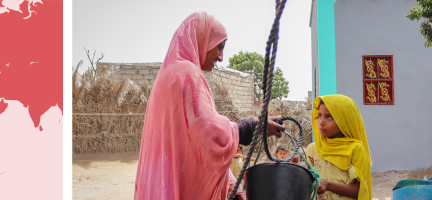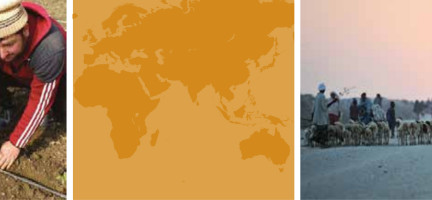Land for food security and climate action

The Arab region the most affected by the negative impact of climate change. Rising sea levels, desertification, land degradation, salinization, changes in land uses, pollution, as well as greater incidence of natural hazards such as flooding, droughts and wildfires increases the vulnerability of both human settlements and agricultural areas threatening arable lands and pastures [1].
Ninety-two percent of the land in the region is hyper arid and 73 per cent of arable land is affected by land degradation[2]. The economic cost of land degradation is estimated to be between 2 per cent and 7 per cent of the GDP of individual countries. The combined effect of these factors has led to agricultural decline and food insecurity. Fresh water scarcity is a major issue in 19 of the 22 Arab countries, with 84 per cent of the population affected by, or is at risk of, water scarcity [3].
Climate change also increases the predisposition to conflict and forced displacement and increases migration. World Bank reports that 10 to 20 per cent of rural–urban migration in the Middle East and North Africa region are related to climatic factors.2
Security of tenure is in the critical path of sustainable land management, addressing land degradation and desertification and promoting food security. Good land governance is crucial to increase local communities’ security of tenure and resilience to the impact of climate change. It is also important to unlock the action of communities towards land restoration, land degradation neutrality, adoption of carbon neutral approaches, protection of semi-natural and protected areas and the increase of ecosystem services in the region.
The recommendations:
Good land governance and land tenure security are essential for sustainable development in the context of climate change. The Arab Land Initiative recommends:
- Setting, committing to, monitoring and reporting against land-related Sustainable Development Goals (SDGs) indicators and National Land Degradation Neutrality (LDN) targets aimed at the mitigation of and adaptation to the adverse impacts of climate change and at halting or reversing land degradation.
- Pursuing holistic and multidimensional approaches that aim to protect productive ecosystems and the services they provide, and that simultaneously prioritize human security and stability.
- Adopting sustainable land management and land use planning as key tools for responding to pressing environmental issues, but also as key tools to halt land, rangeland and forest degradation and guide urban expansion.
- Promoting sustainable and climate-resilient urbanization through climate sensitive spatial planning and disaster risk management to ensure urban centres are safe from climate hazards.
- Restoring degraded land to promote food production hence food security and a better life for all.
- Establishing and ensuring the effective implementation of social and environmental safeguards to protect the livelihoods and tenure rights of those affected by largescale infrastructure and “green grabbing” projects (for example, small farmers and refugees) against forced evictions.
- Securing land tenure rights to ensure the effective participation of all people in climate action, for example, by investing in climate adaptation interventions to ensure the sustainable of use of their land and natural resources, including environmental conservation, preservation of biodiversity, and reduction or reversal of land degradation.
- Supporting and protecting pastoral systems by establishing pastoral laws to regulate grazing and delimit pastoral areas as well as legitimizing customary system, including recognizing customary law in courts, creating water points and planting local fodder. The livelihood of pastoralists should be diversified and complemented to make them more resilient to shocks and climate hazards and to avoid the over-exploitation of natural resources.
- Respecting and formalizing customary land tenure relations between farmers and pastoralists, strengthening dispute resolution mechanisms, and securing a range of services to enhance pastoralists’ well-being, productivity and security.
- Supporting and protecting smallholder farmers through capacity development initiatives, increased access to seeds, tools and products, and access to credit and markets to promote fair competition with large-scale and industrialized landholders in farming.
- Protecting, demarcating and regularizing pastoral corridors for better land use management and dispute resolution.
- Recognizing and improving existing customary and communal land management systems to make them better suited to address modern societies’ challenges resulting from climate change.
- Adopting fit-for-purpose and climate-resilient land administration approaches to promote practical solutions to security of tenure and land-use management.
- Promoting just legal and institutional frameworks that consider existing tenure and social relationships, and seek innovative approaches to reconcile customary and statutory laws, secure customary land tenure arrangements, and protect women rights to land for the achievement of the SDGs and the effective response to climate change.
- Embracing multi-level governance (subnational, local and municipal governments and non-State actors) in response to climate change mitigation and adaptation.
- Engaging local stakeholders, including land professionals, government officials, community leaders, religious and traditional leaders, youth, researchers, grassroots representatives and members of the academia, to achieve and improve land governance, securing land rights and advancing land degradation neutrality and land restoration.
- Learning from existing effective and inclusive customary land tenure arrangements for sharing natural resources and resoving conflicts, and exploring new innovative communal land tenure arrangements for securing land rights.
- Strengthening cooperation at the regional level. This requires building vertical and horizontal collaborative relationships between different groups. National and local land actors must be capacitated, empowered and connected to lead sustainable land governance and climate actions in their communities and countries. International organizations can play a key role in supporting and facilitating the creation of such networks as well as in building a top-down and a bottom-up knowledge base while “continuing to act as a convening platform” and ensuring that all voices are heard.
The approach:
The Initiative contributes to addressing land governance for food security and climate action by:
- Promoting research and documentation of case studies
- Conducting capacity development events and expert group meetings
- Facilitating debates and technical discussions in national and international forums
Bridging the gap among experts from different disciplines through multi-stakeholder initiatives.
References

